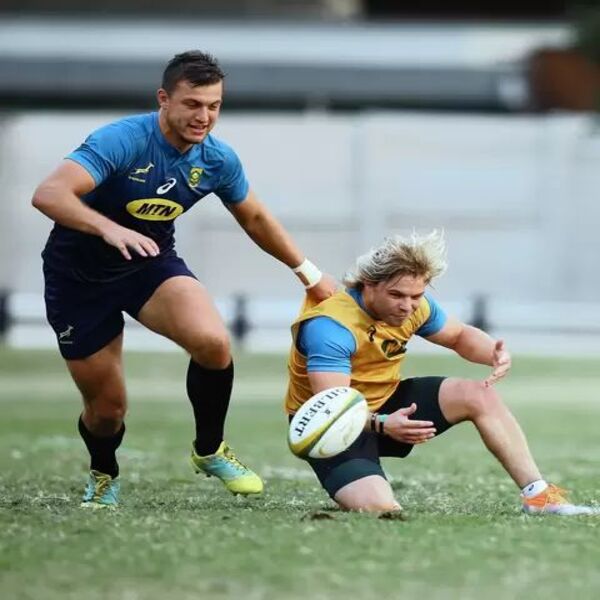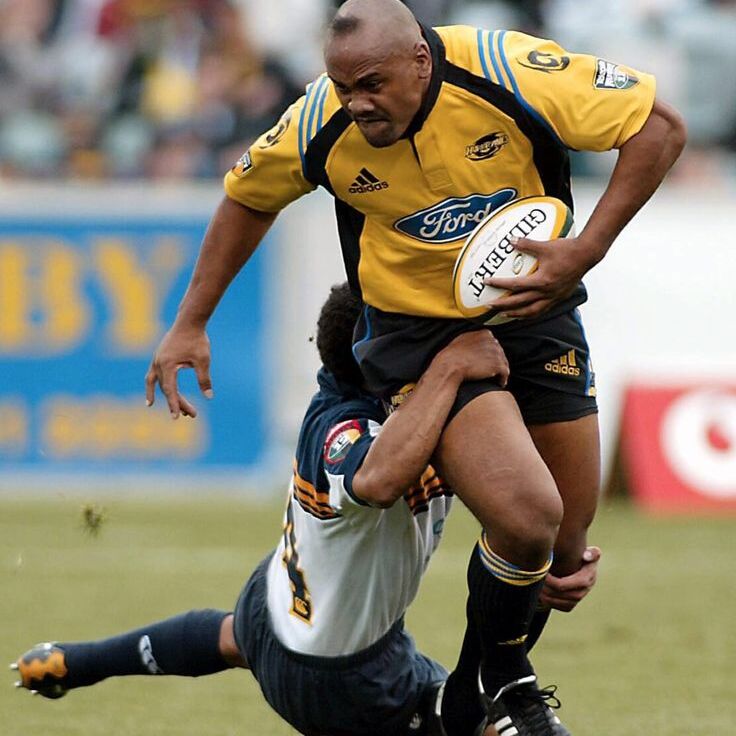Introduction to Knock-Ons
What is a knock on in rugby? Knock-ons are a fundamental aspect of rugby union, and understanding them is vital for players and fans alike.
Definition of a Knock-On
A knock-on in rugby occurs when the ball moves forward from a player’s hand or arm. This typically happens when trying to catch or handle the ball. If the ball hits the ground or another player before being regained, it’s a knock-on.
The Consequences of a Knock-On
When a knock-on occurs, the opposing team is awarded a scrum. This stoppage and reset of play often shifts the game’s momentum. Knock-ons can disrupt offensive flow and cause turnovers, having a significant impact on the match’s outcome.

Deliberate Knock-Ons
A deliberate knock-on in rugby union is a tactical foul. It happens when a player intentionally hits the ball forward to disrupt the opponent’s play. This act is against the rules and can lead to strict penalties.
The Penalty for Deliberate Knock-Ons
In case of a deliberate knock-on, referees often penalize the offending player. The usual penalty is a sin-bin for ten minutes, impacting the team’s performance. A yellow card or even a penalty try can also be awarded, depending on how the action affected the potential scoring opportunity.
The Impact of a Deliberate Knock-On on the Game
Deliberate knock-ons can change the direction of a game significantly. They can stop a promising attack, forcing a turnover of possession. Sometimes they prevent a near-certain try, drawing frustration from players and fans. These actions can change the momentum of the game and potentially influence the final score.
The Knock-On in Action
Understanding the rules is one thing, but seeing knock-ons during matches brings clarity. Let’s take a closer look at some instances where knock-ons have made a decisive impact on the game.
Examples of Knock-Ons in Notable Matches
High-pressure situations often lead to knock-ons. For instance, Owen Farrell once saw a try disallowed after Courtney Lawes’ tackle led to a knock-on in the 2018 Calcutta Cup match. Chris Ashton also experienced knock-on woes in a critical Toulon versus Lyon match in 2018, resulting in a draw that cost his team a semi-final spot. These events highlight that even elite players can slip up under stress, leading to significant repercussions for the team.
High-Profile Incidents and Implications
Knock-on decisions can stir debates and have wider implications. Jonny May’s 2017 red card for repeated deliberate knock-ons is a case in point. It sparked discussions about the fairness of current rules. Similarly, Maro Itoje is known for his proficiency in chargedowns — a legal tactic rather than a knock-on — showcasing the skill’s strategic importance. Such high-profile incidents can lead to rule clarifications and even changes, as administrators seek to balance fair play with the game’s evolving strategies.

Obstruction and Knock-On Rules
Understanding obstruction and knock-on rules is key in rugby union.
Legal Physical Contact and the Knock-On
Physical contact in rugby is complex. Pushing an opponent is allowed in some cases, but not always. A ‘knock on’ happens when a player moves the ball forward accidentally. This is not allowed. Rules say you can push shoulder to shoulder when running for the ball. But if you push and cause a knock-on, that’s against the rules.
How Obstruction is Penalized in Rugby
Rugby has strict rules about obstruction. You can’t tackle someone without the ball. If you do, the other team gets a penalty. Also, you can’t block or stand in the way on purpose. If caught, you might spend 10 minutes in the sin-bin. This can hurt the team’s chances. Knowing what is allowed and what is a foul helps players avoid penalties. It also keeps the game fair and safe for everyone.
Interpretation of the Knock-On Rule
Rugby’s knock-on rules require careful interpretation. Referees must decide if a knock-on was accidental or on purpose.
Referee’s Role in Deciding Intentional Knock-Ons
A referee’s judgment is key when deciding if a knock-on is deliberate. They must look at the player’s actions. Did the player mean to knock the ball forward? The answer affects the game. A wrong call can lead to unfair penalties.
How the TMO Influences Knock-On Decisions
The TMO, or Television Match Official, helps the referee. They use video to review knock-ons. This can make decisions clearer. But, it also adds debates. Was the ball knocked on? Did the player have a chance to catch it? The TMO aids in making tough calls.

Controversial Knock-On Calls and Their Impact
Incidents That Sparked Debate
In rugby union, controversial knock-on calls can cause heated debates. A knock-on, as we know, is when a player accidentally propels the ball forward. But what happens when the intent is not clear? These grey areas lead to arguments and often require closer inspection. For example, the Beale incident during the Wales versus Australia game in 2021 divided opinions. The ref’s decision to hand out a yellow card for intentional knock-on was hotly contested, with some arguing Beale was trying to wrap around the attacker. Controversies like these highlight the complex nature of interpreting knock-on laws.
How Controversies Influenced Rule Clarifications
These debates can lead to rule clarifications and sometimes, changes. After controversial incidents, rugby authorities often re-examine the rules to reduce misunderstandings. They aim to keep the game fair and enjoyable. Clarifications help players, refs, and fans get on the same page. For instance, the distinction between deliberate and accidental knock-ons has become clearer. Officials are now more informed when deciding penalties. These changes seek to uphold the spirit of rugby while ensuring the rules evolve with the game. Promoting positive play remains the core goal, with fairness at its heart.
Encouraging Positive Play
Encouraging positive play is at the heart of rugby union regulations.
Law Changes and Evolving Strategies
Rugby laws change to make the game better. New strategies from players always help the game grow. Players like Maro Itoje, who mastered the chargedown, show us how skills shape the rules. When the game changes, so do the laws, keeping rugby fair and exciting.
The Fine Line Between Strategy and Foul Play
There’s a tricky balance in rugby between smart play and breaking the rules. Deliberate knock-ons are foul play and punished. But sometimes, what looks deliberate may not be. Referees have to watch closely. They make sure that smart moves remain within the spirit of the game, not crossing into fouls. It’s about fairness, skill, and respect for the game.
Conclusion
As we wrap up our exploration of knock-ons in rugby, it’s crucial to review the importance of this rule and how it shapes the game. Understanding knock-ons is not just about knowing the rules; it’s about appreciating the nuances of the sport and the impact on the match’s flow. From accidental drops to strategic plays, each knock-on has the potential to turn the tide of a game. For players, knowing how to handle the ball under pressure can be the difference between victory and defeat. For fans, a deeper comprehension enhances the viewing experience, as they grasp the significance of each whistle blow.
Reviewing the Importance of Understanding Knock-Ons
To fully appreciate rugby union, grasping the concept of knock-ons is key. It helps us understand why certain stoppages occur and the strategies behind players’ actions. Knowing whether a knock-on is deliberate helps us see the game’s tactical depth. Players must be skilled and disciplined to avoid costly errors that lead to scrums or penalties.
The Future of Knock-On Rules and Their Enforcement
As rugby continues to evolve, so might the rules around knock-ons. With advancements in technology, such as TMOs, decisions on knock-ons may become more precise. However, the heart of rugby will always seek to maintain a balance between promoting positivity and reducing cynical play. The future could see further rule clarifications, ensuring that the game remains fair and competitive. It’s clear that as long as rugby union thrives, the conversation around knock-on rules will continue to be a pivotal aspect of the sport.